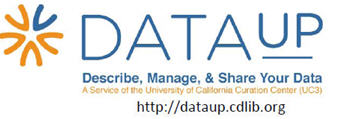DataUp Service Update: November – December 2012
Recent Enhancements, News, and Activities
- We successfully established a “Practice Repository” for DataUp, allowing those interested in using DataUp in practice mode to get an identifier and archive their practice data without impacting the legitimate content in ONEShare.
- DataUp was featured at the Microsoft Research booth during the American Geophysical Union (AGU) 2012 Fall Meeting in San Francisco, CA (3-7 December). Visitors to the booth could watch a demonstration of DataUp and ask questions about its features.
- Strasser presented on DataUp at the AGU meeting for a session on tools and workflows for research data (invited).
- DataUp was presented at the Coalition for Networked Information 2012 Members Meeting in Washington, DC (10-11 December) by Strasser. The presentation was part of a session on tools for managing and archiving research data.
- We presented DataUp to the UC libraries community at two, two-day workshops on data curation in early November. The first workshop took place in Oakland (8-9 November), and the second was at UC Irvine (13-14 November).
DataUp Service Description
The DataUp add-in and web application help researchers organize, manage, archive, and share their tabular data. The major functionality of both tools is to guide researchers through the following:
- Carry out a best practices check to determine if there are issues present that might make use or interpretation of the data difficult
- Create metadata in standardized EML (Ecological Metadata Language) format
- Describe the attributes (i.e. columns) of the dataset in standard EML format
- Obtain a unique identifier for the dataset
- Generate a data citation
- Post the data and associated metadata to a data repository
DataUp Service Manager
Carly Strasser carly.strasser@ucop.edu or uc3@ucop.edu.
DataUp Training Materials, Guides, FAQs and Webinars
The most current DataUp information is on the website (http://dataup.cdlib.org). This includes frequently asked questions and instructions on accessing and using DataUp. Other relevant sites include the code site (https://bitbucket.org/dataup/main) and the web application site (http://dataup.org).

